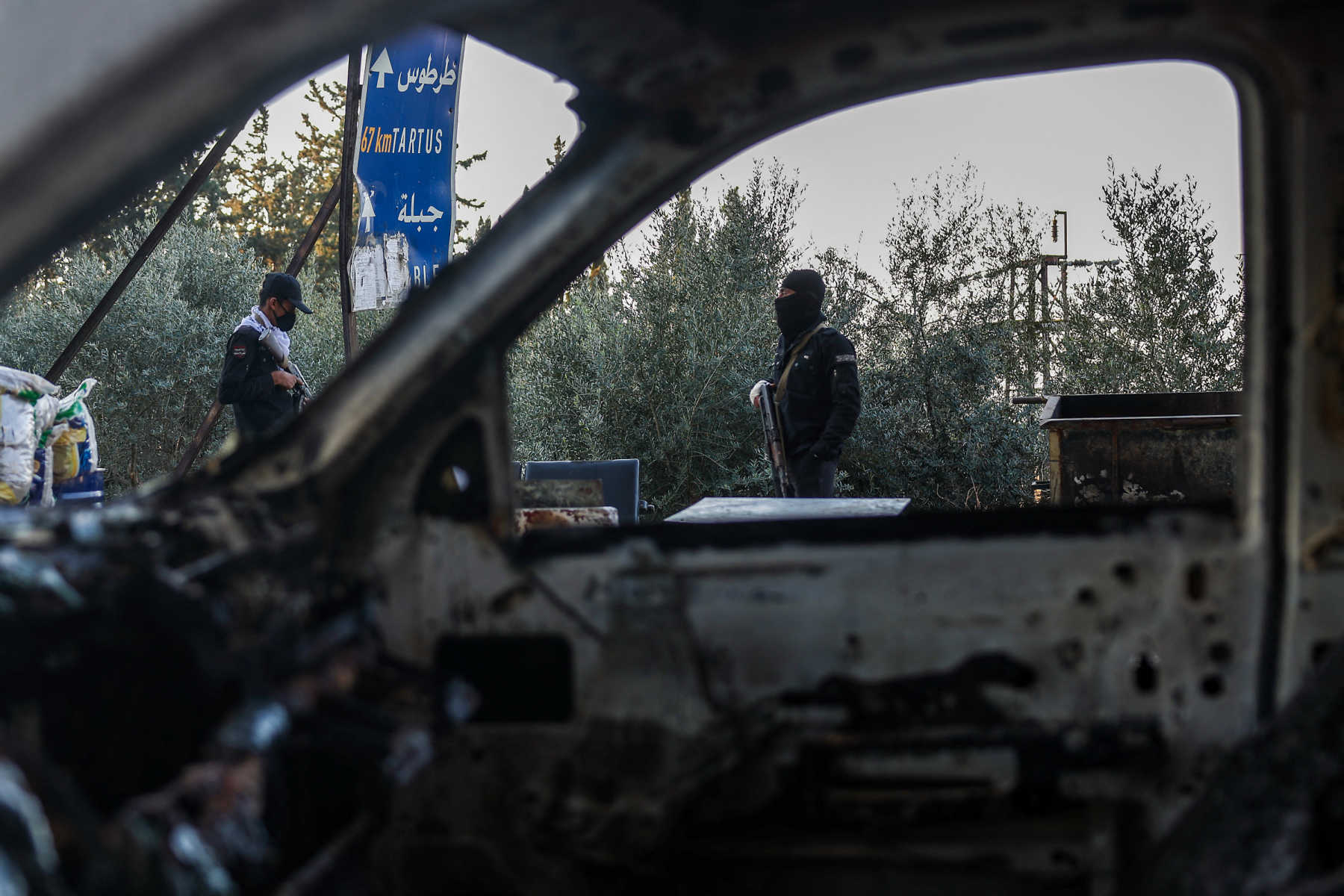Yara M. Asi is a non-resident fellow at DAWN and the author of How War Kills: The Overlooked Threats to Our Health. She is an assistant professor at the University of Central Florida in the School of Global Health Management and Informatics, and a visiting scholar at the FXB Center for Health and Human Rights at Harvard University, where she is co-director of the Palestine Program for Health and Human Rights.
It is in many ways the cultural and commercial hub of the West Bank. Home to more than 170,000 people, and to the largest Palestinian university, Nablus hosts a robust economic sector and is a vital access point for the surrounding villages of the northern West Bank, including for medical services. The city is in Area A, the part of the occupied West Bank supposedly afforded full security and civil control by the Palestinian Authority in the Oslo Accords.
But for more than two weeks now, Nablus has been essentially closed off—not by the PA's forces, but by the occupying Israeli military. The multiple roads into and out of the city have been blocked by gates, dirt mounds and checkpoints, all guarded by Israeli forces. Videos have circulated widely on social media of Palestinian cars waiting in long lines at these checkpoints, of Palestinians trying to dig out the dirt mounds to reopen the roads, and of Palestinians waiting at closed gates to access their own land to harvest olives. In addition to this heavy Israeli military presence, many of the villages around Nablus have also been terrorized by mobs of Israeli settlers descending from their hilltop settlements to vandalize Palestinian cars and businesses, destroy Palestinian olive groves by cutting down trees or spraying them with pesticide, and in general, harass Palestinians and threaten violence—all with impunity, sometimes under the watch of Israeli soldiers.
The reason given for this blockade and near-daily Israeli military raids into Nablus is ostensibly to find members of a new militant group, the Lions' Den (Areen al-Usud), which in recent weeks has claimed responsibility for killing an Israeli soldier stationed at a checkpoint, among other incidents. In general, the group has become a growing concern for both Israel and the PA. Made up primarily of young men who have lived their entire lives in the post-Oslo period, the Lions' Den claims to be reshaping the West Bank's resistance to decades of Israeli occupation, which has evolved into creeping annexation in recent years, with escalating violence and repression. The militant group's exploits are widely shared on Palestinian social media, and offshoots are starting to spring up throughout the West Bank, in the face of failure after failure of the so-called peace processes that Palestinians keep being told will someday, eventually, maybe offer them self-determination and sovereignty.
A form of "Gaza-fication" is underway in the shrinking Palestinian pockets of the West Bank.
- Yara M. Asi
Palestinians in the West Bank are used to enduring heightened violence from settlers and Israeli military restrictions ahead of Israeli elections, and the fifth Israeli election in just the past three years is barely a week away, on Nov. 1. Showing dominance over Palestinians is a tried-and-true pre-election technique for many Israeli politicians. Indeed, many bombing campaigns of Gaza seem to take place during election seasons in Israel and have even been lauded in campaign ads, like a notorious spot by Benny Gantz in 2019. Unlike Gaza, the occupied West Bank has not been subject to such devastating airstrikes and bombardments. Instead, it suffers from a complex system of movement restrictions for Palestinians and their goods, a forceful Israeli military presence, especially at the many checkpoints stationed throughout the small territory, and consistent land appropriation and seizure to support Israel's vast and expanding settlement infrastructure and military zones.
But with the rise of active militant resistance groups in the West Bank, a form of "Gaza-fication" is underway in the shrinking Palestinian pockets of the West Bank. Israel has justified its siege of Nablus, closing the city and its residents off from the outside world, as a military operation to find and kill members of the Lions' Den—similar to how it justifies its recurring military offensives in Gaza by the presence of Hamas and their rocket attacks into Israel. The wider aim of Israel's closure of Nablus is to discourage the city's population from supporting the group. It is its own form of collective punishment, like the 15-year blockade of Gaza and regular airstrikes that destroy homes, hospitals and factories, and ruin vital infrastructure. In Gaza, Israel has not been shy about engaging in tactics intended to not only target Hamas operatives directly but to put "pressure" on the people of Gaza as collective punishment, despite being a violation of international law.
Many of the major players in Israel's government have also made no secret of their lack of interest in an independent Palestinian state, or equal rights for Palestinians within the Israeli state, with some going so far as calling to expel Palestinians entirely. Rhetorically turning the West Bank into another rogue Palestinian territory overrun with militants that need to be quelled at all costs—including through the use of armed drones that can now patrol the skies—helps Israel justify its violence, with echoes of the Second Intifada. Whatever international legitimacy the PA has retained since Oslo doesn't seem to matter. Brief visits to the West Bank by foreign leaders, like U.S. President Joe Biden who met with Palestinian President Mahmoud Abbas just a few months ago in Bethlehem, do little to prevent Israel from exerting even more control over Palestinians, especially since these same leaders never criticize Israel or its actions.
How can the Palestinian Authority claim to be any authority at all if the West Bank is, increasingly, treated like the besieged Gaza Strip, except with the constant and growing presence of the Israeli military and settlers?
- Yara M. Asi
Just before Israel's siege of Nablus, the U.N.'s special rapporteur on the situation of human rights in the Palestinian territories, Francesca Albanese, released a report detailing the "settler-colonial features of the prolonged Israeli occupation." It was the first time that such a U.N. report had put the occupation of the West Bank in the context of aims that are becoming increasingly less subtle in Israeli policy and rhetoric. "The occupation is not merely belligerent, but is settler-colonial in nature," Albanese's report noted. "The containment of the colonial population into heavily controlled reserves"—like Gaza and, now, the Palestinian cantons of the West Bank—"is at the core of the settler-colonial goal to ensure the demographic supremacy and prevent Palestinian self-determination." And just last week, a U.N.-appointed Commission of Inquiry report found that "Israel's occupation of Palestinian territory is unlawful under international law due to its permanence and the Israeli government's de facto annexation policies," and recommended the issue be referred to the International Court of Justice.
These reports were mostly ignored internationally or criticized by the U.S., Israel's closest ally, for being "one-sided." The assumption seems to be that Israel's consistent failure to meet the standards of international humanitarian law, in both Gaza and the West Bank, is justified because of its security needs, for which there is no limit to its actions. The needs of Palestinians, however, are condensed into anodyne, contextless topics like economic growth and some abstract notion of "peace," while they live under siege.
This disjointed reality, evidenced by the fact that Israel can essentially close a major Palestinian city with no international pushback, only further encourages the growth of these militant groups, which will in turn likely lead to Israel adopting more policies in the West Bank that resemble its brutal actions in Gaza. How can Palestinians be expected to live like this, behind walls and under siege? How can the Palestinian Authority claim to be any authority at all if the West Bank is, increasingly, treated like the besieged Gaza Strip, except with the constant and growing presence of the Israeli military and settlers?

















![Security forces loyal to the interim Syrian government stand guard at a checkpoint previously held by supporters of deposed president Bashar al-Assad, in the town of Hmeimim, in the coastal province of Latakia, on March 11, 2025. Syria's new authorities announced on March 10, the end of an operation against loyalists of deposed president Bashar al-Assad, after a war monitor reported more than 1,000 civilians killed in the worst violence since his overthrow. The Syrian Observatory for Human Rights said the overwhelming majority of the 1,068 civilians killed since March 6, were members of the Alawite minority who were executed by the security forces or allied groups. (Photo by OMAR HAJ KADOUR / AFP) / “The erroneous mention[s] appearing in the metadata of this photo by OMAR HAJ KADOUR has been modified in AFP systems in the following manner: [Hmeimim] instead of [Ayn Shiqaq]. Please immediately remove the erroneous mention[s] from all your online services and delete it (them) from your servers. If you have been authorized by AFP to distribute it (them) to third parties, please ensure that the same actions are carried out by them. Failure to promptly comply with these instructions will entail liability on your part for any continued or post notification usage. Therefore we thank you very much for all your attention and prompt action. We are sorry for the inconvenience this notification may cause and remain at your disposal for any further information you may require.”](https://dawnmena.org/wp-content/uploads/2025/04/syria-22039885951-350x250.jpg)











![Security forces loyal to the interim Syrian government stand guard at a checkpoint previously held by supporters of deposed president Bashar al-Assad, in the town of Hmeimim, in the coastal province of Latakia, on March 11, 2025. Syria's new authorities announced on March 10, the end of an operation against loyalists of deposed president Bashar al-Assad, after a war monitor reported more than 1,000 civilians killed in the worst violence since his overthrow. The Syrian Observatory for Human Rights said the overwhelming majority of the 1,068 civilians killed since March 6, were members of the Alawite minority who were executed by the security forces or allied groups. (Photo by OMAR HAJ KADOUR / AFP) / “The erroneous mention[s] appearing in the metadata of this photo by OMAR HAJ KADOUR has been modified in AFP systems in the following manner: [Hmeimim] instead of [Ayn Shiqaq]. Please immediately remove the erroneous mention[s] from all your online services and delete it (them) from your servers. If you have been authorized by AFP to distribute it (them) to third parties, please ensure that the same actions are carried out by them. Failure to promptly comply with these instructions will entail liability on your part for any continued or post notification usage. Therefore we thank you very much for all your attention and prompt action. We are sorry for the inconvenience this notification may cause and remain at your disposal for any further information you may require.”](https://dawnmena.org/wp-content/uploads/2025/04/syria-22039885951-360x180.jpg)







